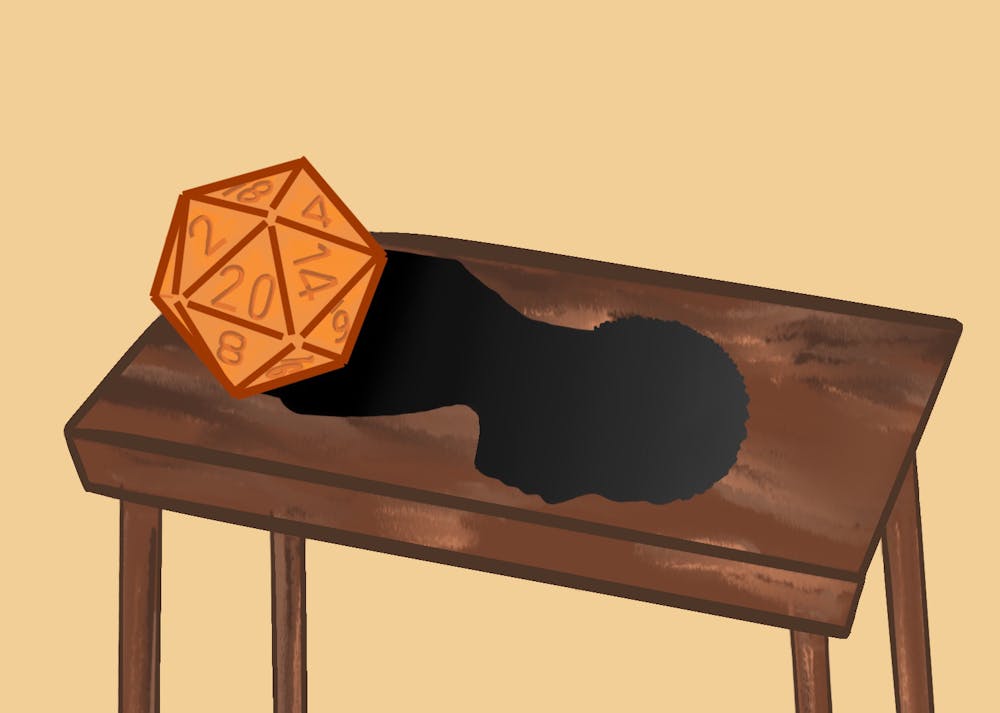Between exams, internships and part-time jobs, four-to-six hour sessions of Dungeons & Dragons with friends isn't a possibility for many college students.
Despite the time commitment, D&D, along with other tabletop roleplaying games, are gaining popularity among college students. In 2020, 24% of D&D players were between 20 and 24 years old.
D&D's prevalence in popular media has been on the rise making more casual viewers aware of its presence, with a brief appearance in Netflix's "Stranger Things," as well as the upcoming release of "Dungeons & Dragons: Honor Among Thieves." TTRPG-based podcasts like "Critical Role," "The Adventure Zone" and "Dimension 20" have also allowed listeners to follow entire games session by session.
With an actively expanding definition, the traditional TTRPG is something like D&D — a game master acts as a facilitator of a story while a group of players follows rules and uses dice to guide them through actions to get to a conclusion of that storyline.
In 2021, TTRPG sales saw a 31% increase; a sharp rise partially the result of COVID-19. D&D alone generated an estimated $100 to 150 million in revenue that same year.
Given most TTRPGs are able to be played in small, isolated groups in-person or virtually, it's easy to see why it would be appealing to students in quarantine. Beyond the initial temptation of a convenient COVID-era activity, TTRPGs have a unique appeal to college students.
For one, they offer a scheduled activity in the same way a sport or club might, ensuring friend groups get together and have something planned when they do.
"It was kind of just like a little, relaxing, fun thing to do with a group of friends," said Angela Githens, a senior studying biological sciences who has been a TTRPG player since her senior year of high school. She is working on creating a TTRPG for her thesis project.
"It's a regular way to meet up with friends and have a good time," said Andy Kwon, a graduate student studying counseling. He's been playing D&D for at least six years, and running his own games as game master for four years. "For a lot of friend groups, I don't think that's like a built-in thing."
"It was just kind of like a collaborative way to tell stories," Githens said. "I like that togetherness, I don't really care about winning a lot."
That collaboration also lends itself to increasing individual creativity.
"When it's up in your head, there tends to be a lot of backspacing," said Abigail Dela Cruz, a freshman studying interior design who has been playing D&D since 2019. "When you explore with other people, they give you ideas, or they reassure you that, 'Hey, yeah, that's a good idea' … Basically, it's like a huge brainstorm."
Exchanging ideas isn't just a fun creative exercise either, it can provide valuable emotional reassurance that benefits a player's overall mental health.
"Whenever we communicate what thoughts we're having, we're sending a message not only to ourselves, but the people around us ... 'My feelings and my thoughts are valid, and they matter,'" Kwon said. He often finds his counseling education provides him with unique gameplay insights.
"It also gives other people a chance to reaffirm that right to say, 'Oh, that's a cool idea. Let me take that and add to it,'" Kwon said. Because TTRPGs encourage improvisation, and opportunities to share ideas about story and character are abundant. "It's just this never-ending echo chamber of validation at the end of the day."
Part of making a space for improvised moments is ensuring the game is a safe place for players to be vulnerable. Often, stories can feature heavier themes with intense character moments and interactions.
"You may not realize that you have an issue about something, but suddenly you're experiencing it," said Benjamin Krich, a sophomore studying music therapy and president of Adventurers Wanted Inc., an ASU student organization working to connect students interested in TTRPGs.
Still, it's the vulnerability that can generate valuable personal insights.
"When your friend gets hurt by a monster, what do you do?" Kwon asked. "Maybe you're playing a character who can heal and cast spells, and that's your wheelhouse … Whereas someone else might be like, 'Oh, I'm gonna, I'm gonna hit, stab this monster with a sword,' and both things are valid reactions.
"It gives you a chance to figure out more who you are," Kwon said. "It lets you explore yourself on a much deeper level than just reflecting and thinking will do."
The ability to respond and often solve dire, fictional circumstances can also benefit players by giving them control of a situation.
"When you go to D&D, or like any tabletop roleplaying game, you have more control over something that's like really fantastical," Dela Cruz said. "I feel like that's a major factor in what helps people in terms of … mental wellness."
When intense situations arise, it’s best for TTRPG groups to have fail-safes and safety measures in place. In Krich's experience, fail-safes can be as simple as "a red card or a stop sign, like, 'nope, we're done doing this.'"
It's also becoming increasingly common for TTRPG systems to include guidelines for making a safe play space. In 2020, "Tasha's Cauldron of Everything," an additional sourcebook on the basic rules of D&D 5e, included a section detailing the importance of a 'session zero' where the GM and players can establish boundaries and ground rules before playing.
"TTRPGs are not therapy," Krich said. "Unless that is explicitly clear for everyone involved … it's not an appropriate setting for that."
'Session zero' is just one example of how TTRPGs are becoming more inclusive.
"There are a lot of systems out there, even newer systems, that make it more accessible for new players," said Abby Loebenberg, a professor of social and cultural anthropology at Barrett, The Honors College. Her research focuses on games, including TTRPGs, although she prefers board games herself.
"Now that we have the internet, and … spaces like Itch to publish on," Loebenberg said. “I think that there is a much wider diversity of people participating in the space.”
Krich has similar hopes. "Let's face it, for a very long time, (D&D) was a male-dominated game. But … especially now, with how popular the game has been, I want to make it clear that this is not a game just for men."
At least for D&D, gender diversity does appear to be on the rise. A 2020 study performed by Wizards of the Coast found about 40% of players identify as female. An increased number of TTRPGs and TTRPG players also means there are more individualized experiences, as each game is changed by the people participating in it.
"Students who come from a creative writing angle at tabletop games have a very different vision for what the game might look like, from students who come from like a performance or drama major," Loebenberg said. "You might have a very different vision of what tabletop games look like when you encounter it through these different pathways."
For both players and GM's, TTRPGs offer an opportunity to create a story they'd like to experience.
Whether that means exploring exciting new fantasy and science fiction-inspired locations or creating a character you'd never seen on TV, it doesn't matter, because the experience is determined solely by you, the player and the people around you.
Edited by Piper Hansen, Jasmine Kabiri and Anusha Natarajan.
Reach the reporter at cvandore@asu.edu and follow @cvandoren27 on Twitter.
Like The State Press on Facebook and follow @statepress on Twitter.

Claire van Doren is the Echo desk editor, using her English Literature and Journalism majors to bring insightful, thought-provoking pieces to The State Press. She has a deep love of storytelling that extends to articles, television, podcasts, and novels.




